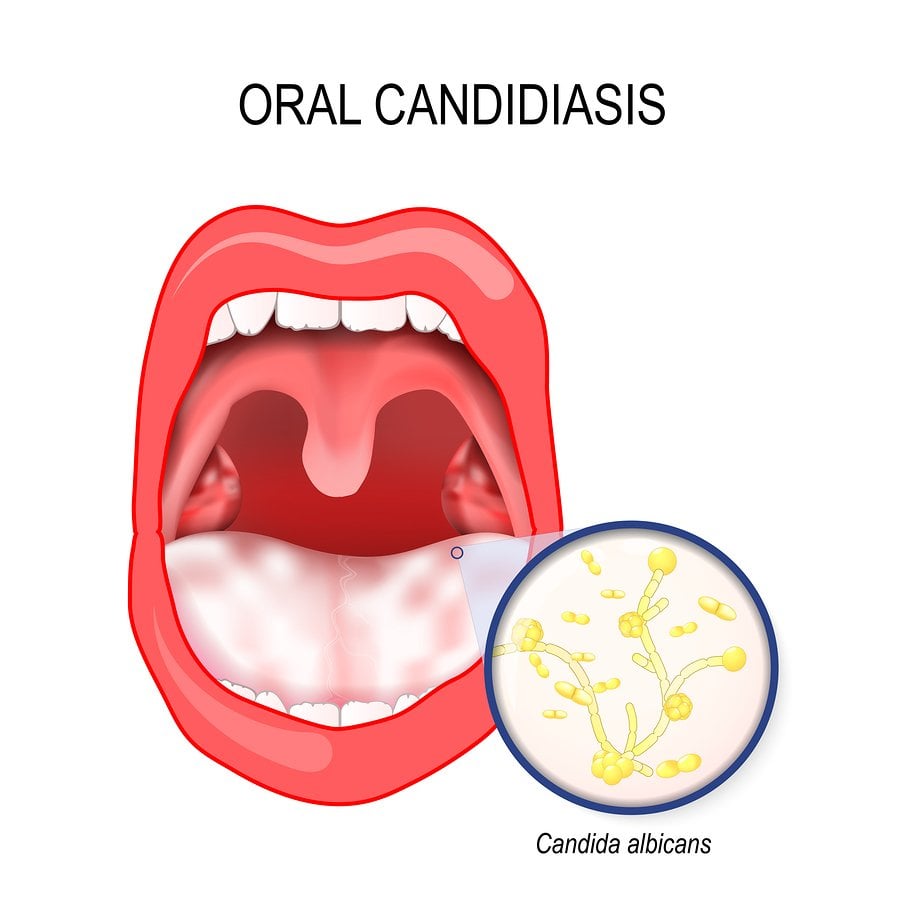Oral Thrush: Causes, Symptoms, & Remedies

Summarize with AI
Also known as oral candidiasis, oral thrush is an unnerving ailment that can cause stress and worry, especially when it affects infants. Here is our guide to help you understand the causes, signs and treatments for this stubborn fungal infection.
What Causes Oral Thrush?
Oral thrush occurs when the fungus Candida albicans accumulates in high numbers on the lining or oral tissue. A normal and usually harmless organism within the human mouth, candida can sometimes overgrow, causing creamy white-colored lesions, usually on the inner cheeks or tongue. In some instances, thrush can also spread to the gums, tonsils, back of the throat and roof of the mouth
While it can affect anyone at any age, oral thrush tends to be more common in babies and seniors, due to weakened immunity. It is also more common in people who are taking certain medications that reduce immune function and in people who have existing health conditions that reduce their immune responses.
In certain situations, a person may develop oral thrush after taking antibiotic medications for a separate infection. This is because the medication kills some of the healthy bacteria within the mouth, giving candida more room to spread throughout oral tissue.
What Are the Signs and Symptoms of Oral Thrush?
Oral thrush symptoms may be nonexistent for a while. Once fungal cells began to spread, however, you may notice the following telltale signs:
- Reduced taste
- White, creamy lesions on the inner cheeks, tongue, tonsils, gums or roof of the mouth
- Slightly elevated lesions that look a little like cottage cheese
- Burning, soreness or redness that may make it hard to swallow or eat
- Light bleeding if lesions are scraped or rubbed
- Redness or cracking at the corners of the mouth
- Pain, irritation or redness beneath dentures, also known as denture stomatitis
- A dry, cottony sensation within the mouth
In severe instances, typically related to cancer treatments or HIV/AIDS, lesions can spread into the esophagus. When this occurs, people often have difficulty swallowing or the sensation that food is struck within the throat.
In infants, oral thrush will usually cause fussiness, irritability, feeding difficulties and the distinctive white mouth lesions. Babies can also pass along a candida infection to mothers during breastfeeding and vice versa. When a nursing mother’s breasts are infected with candida, she will often experience the following:
- Bright red, cracked, sensitive or itchy nipples
- Flaky or shiny skin on the areola
- Stabbing pains within the breast
- Unusual nipple pain while nursing or between feedings
Is Oral Thrush Contagious?
Since every person has naturally occurring Candida albicans within their mouths, oral thrush is not contagious, with the exception of breast feeding mothers and babies.
How to Get Rid of Oral Thrush
Thrush treatments typically center on stopping the rapid spread of candida; however, the best approach depends on a person's age, health and the cause of the outbreak. For healthy children and adults, doctors often recommend antifungal medications as tablets, lozenges or liquids. If this is ineffective, other medications may be prescribed to target the entire body.
For infants and nursing mothers, doctors generally prescribe mild antifungal medications for babies and antifungal topical cream for the mother's breasts. For adults with weakened immune systems, doctors usually prescribe more powerful antifungal medications.
Many people recommend oral thrush home remedies, such as virgin coconut oil, apple cider vinegar, tea tree oil, or essential oils; however, these are not proven to be effective and may cause more harm than good. Yogurt and probiotics may help to prevent oral thrush, but more research is needed to prove this.
Preventing Oral Thrush
Nursing mothers can prevent oral thrush by air-drying their nipples and avoiding damp or wet nursing cloths. Pacifiers, bottles and nipples should also be regularly washed, using soap and hot water. For people who need daily-inhaled corticosteroids to control asthma, it's usually a good idea to use spacers when using metered-dose inhalers.
If you are put on a course of antibiotics, there is some evidence that you may be able to reduce your risk of developing oral thrush by taking probiotics after you've completed all of your medication. It's also a good idea to maintain regular dental checkups to help catch a potential oral thrush outbreak in its infancy.

.png)
